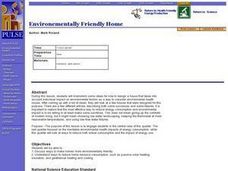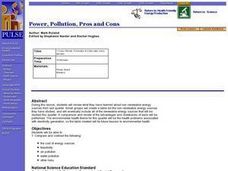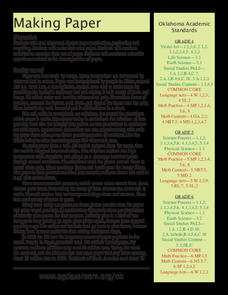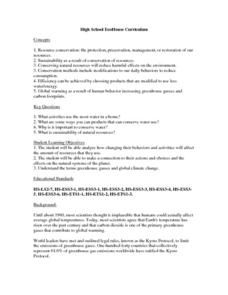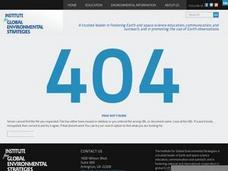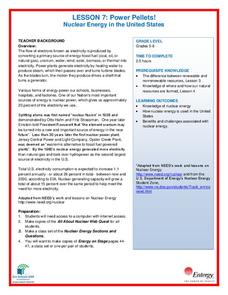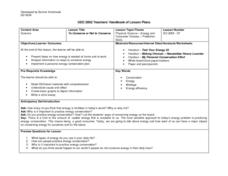Curated OER
Environmentally Friendly Home
Pupils discuss ways to make homes more environmentally friendly. They comprehend ways to reduce home resource consumption, such as passive solar heating, insulation, and geothermal heating and cooling
Curated OER
Measuring Reaction Rates
In this chemical reaction worksheet, students determine the rate of consumption or rate of production for given reactions. This worksheet has 14 problems to solve.
Curated OER
The Urban Heat Island Effect - Lesson 2 (Grades 8-9)
Students use the scientific process to show that when various surfaces are exposed to similar environmental conditions, surface temperatures may vary. They examine the "urban heat island" phenomenon and analyze why it increases energy...
Curated OER
Save the Earth: It's Everyone's Home!
Students research ways to conserve and reduce energy and resources. In this reducing waste lesson plan, students work in teams to experiment with water and losing resources. students brainstorm about ways to conserve and reduce energy...
Curated OER
Rethink Your Drink
Students examine the sugar content of common beverages. In this adult health lesson, students convert grams of sugar to teaspoons. They discuss the benefits of drinking water instead of soda and juices.
Curated OER
The State of the Planet
Students address four different environmental topics (water issues, the threat of food shortages, human population growth, and global warming) as they watch a film and discuss the future of the earth. In groups, they complete various...
Curated OER
Sustainable Development and Canada's Natural Resources
Students use text information, data and graphs to explain what sustainable development is, and to investigate the rate of consumption of Canada's natural resources. In groups, they graph their findings.
Curated OER
Forest Friends Forever
Students investigate how to use the senses to gather information about objects such as size, shape, color, texture, sound, position, and change (qualitative observations are utilized throughout this lesson). They investigate and explain...
Curated OER
Needs and Wants
Students examine the difference between needs and wants. In this consumption lesson, students illustrate their needs and wants and discuss their own reasons for buying things. They also discuss the connection between their choices and...
Curated OER
Materials, Let's Do the Life Cycle
Students examine environmental and social impacts of products that consumers buy. In this environmental stewardship lesson, students play a game that requires them to consider real costs of products. Students consider the environmental...
Curated OER
Class Ketchup
Students describe statistics by conducting a class cooking activity. In this ketchup lesson plan, students conduct a class survey based on ketchup consumption habits by students. Students utilize tomatoes, water and a bottle to create...
Curated OER
Everyday vs. Extreme Relationships with Nature
Students examine the interactions with nature and the environment. They discover where water comes from and ways to conserve water. They also examine energy sources and consumption.
Curated OER
Power, Pollution, Pros and Cons
High schoolers review what they know about non-renewable energy, compare and contrast advantages and drawbacks of each type, such as cost of energy sources, feasibility, air pollution, water pollution, and other risks, and create table...
Curated OER
Making Paper
Fourth graders investigate the paper usage in their classroom and in other countries by using estimation, counting, and measurement skills. They make paper from recycled paper.
Curated OER
Sustainable Livestock
Young scholars investigate healthy eating habits by researching livestock. In this food sustainability instructional activity, students research the negative impact factory farming has on our environment due to pollution. Young scholars...
Curated OER
High School EcoHouse Curriculum
How has the level of carbon dioxide changed over recent years, and what is contributing it? Groups work together to research and present their findings in a creative way. Also built into the lesson is a visit to a sustainable house, but...
Consortium for Ocean Science Exploration and Engagement (COSEE)
Carbon Dioxide & Krill: Impacts
What effects do temperature and carbon dioxide levels have on the zooplankton of Antarctica? This concluding lesson plan in a short unit on climate change and the ocean helps environmental scientists answer these questions. After...
National Wildlife Federation
When It Rains It Pours More Drought and More Heavy Rainfall
Which is worse — drought or flooding? Neither is helpful to the environment, and both are increasing due to climate change. The 16th lesson in a series of 21 covers the average precipitation trends for two different climates within the...
PricewaterhouseCoopers
Waste and Recycling: Recycling Paper
We take paper for granted, while thousands of trees are being made into the paper we toss in the trash. Start a dialogue about paper reduction and recycling in class, and share the negative effects paper production has on our ecosystem....
PricewaterhouseCoopers
Waste and Recycling: Recycling and Energy Recovery
Reduce, reuse, recycle, and recover. Young environmentalists learn about the overwhelming amount of garbage produced and discover better ways to minimize their impact on Earth by learning the difference between garbage and recyclables.
Curated OER
CO2 and You
Students study the scientific evidence about carbon dioxide emissions. They learn to calculate the amount of energy used by different appliances. They complete a worksheet which analyzes the amount of energy that their home uses.
Redefining Progress
Have and Have-Not
Is there a correlation between a country's wealth and the extent of its ecological footprint? What exactly constitutes an ecological footprint, and how does one country stack up against the rest? This is a unique lesson to incorporate...
National Wildlife Federation
Power Pellets! Nuclear Energy in the United States
Nuclear power provides about 20 percent of the energy generated in the United States. The seventh activity in the series of 12 tackles nuclear power. After sharing what they know about nuclear energy, scholars complete a WebQuest make a...
Curated OER
TO CONSERVE OR NOT TO CONSERVE
Students explore how energy is wasted at home and at work and develop a program to save energy in a specific area.
Other popular searches
- Human Water Consumption
- Personal Water Consumption
- Graphing Water Consumption
- Food and Water Consumption
- Water Consumption Need


